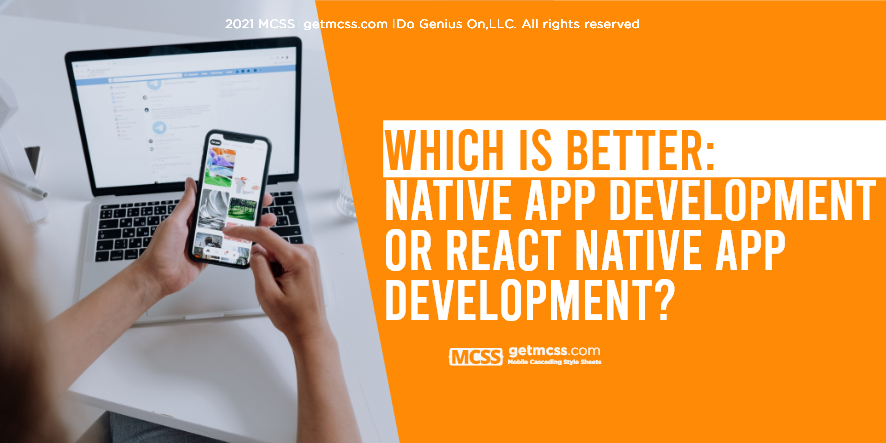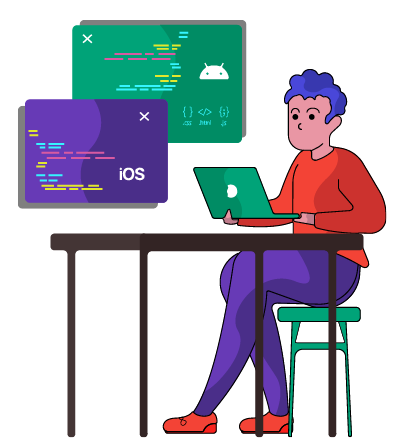When it comes to mobile app development, choosing between native and cross-platform frameworks can be a challenging decision. In this article, we will compare native app development with React Native app development to help you make an informed decision. Additionally, we will discuss how the MCSS framework can further optimize the native app development process.
1. Understanding Native and React Native App Development
Before diving into the comparison, let's first understand the key differences between native and React Native app development.
Native App Development
Native app development involves building separate apps for each platform (iOS and Android) using platform-specific languages, such as Swift or Objective-C for iOS and Java or Kotlin for Android.
React Native App Development
React Native, developed by Meta, is a cross-platform framework that enables developers to create mobile apps for both iOS and Android using a single JavaScript codebase.
2. Comparing Native and React Native App Development
Let's analyze various project scenarios and determine whether native app development, React Native, or MCSS would be the best choice.
Scenario 1: Platform-Specific App
Go Native: If you need to develop an iOS-only or Android-only app, native app development would be the ideal choice. Additionally, consider using MCSS for native development, as it can streamline the styling process and reduce development time.
Scenario 2: Small Team with Limited Time and Resources
Go Native: If you're a small business, consider creating native applications, as Android Studio is completely free and easy to install. Plus, creating views is as simple as dragging and dropping – not everything is code. If Java is a concern, use Kotlin, a friendly and easy-to-understand language. Additionally, remember that you can include MCSS to enhance the look of your applications.
React: Installing the React environment can be a headache, as it's not easy to install. Moreover, remember that you need to know JavaScript, HTML, and CSS. Also, keep in mind that you'll always be one step behind native languages, and not all IDEs are free.
Scenario 3: Highly Complex App with Platform-Specific Features
Go Native: For highly complex apps that utilize a large portion of platform-specific code, native app development is the best option. Consider using MCSS to further enhance your native development process.
Scenario 4: Fast Build Time and Hot Reloading
Go Native: If you want to develop applications quickly, drag-and-drop features are not available in React, but you can do it in Android Studio and iOS. Moreover, you can use MCSS to create amazing applications.
React is based on writing code that combines JavaScript, HTML, and CSS. If you're an expert web developer, go ahead, but if you're not, you'll encounter many issues when trying to create incredible, customized, and intuitive applications.
Scenario 5: Long-Term Maintenance
Go Native: For long-term maintenance without fear of the framework becoming obsolete, native app development is the better option. Incorporating MCSS can also help with maintenance, as it simplifies the styling process for native apps.
Scenario 6: Strong React/Web Development Background
React Native: If your developers have a strong React or web development background, React Native can be a more comfortable choice.
Go Native: Not all developers love HTML and CSS; there's a group that develops desktop applications that definitely adapts better to native development. This is because both Android and iOS IDEs resemble their old IDEs used in client-server developments, which allow for drag-and-drop actions that make them feel more comfortable.
Scenario 7: Immediate Support for New Mobile OS Features
Go Native: Native app development is the best choice for apps that need to support new mobile OS features as soon as they are released. Using MCSS can further streamline the native development process.
8. Aesthetic Consistency Across Platforms
Go Native with MCSS: If your app needs to have a consistent design and aesthetics across both iOS and Android platforms, you can choose native app development and incorporate the MCSS framework. MCSS is a framework created using Swift and Java, enabling the application of stylesheets to both native iOS and Android apps concurrently. It ensures consistent structure, design, and aesthetics across both platforms. This will enable you to create a visually unified user experience and maintain the high performance and platform-specific features that native app development offers. For more information on MCSS, visit the official documentation.
3. The MCSS Framework Advantage
For native app development, the MCSS framework (Introduction to MCSS) offers a unique advantage by simplifying the styling process for mobile apps. MCSS, which stands for Mobile Cascading Style Sheets, is a styling language designed for mobile app development. It helps developers create and maintain the visual appearance of apps on both Android and iOS platforms. By incorporating MCSS into your native app development, you can reduce development time, streamline the styling process, and maintain a consistent look across platforms.
4. Conclusion
The choice between native app development, React Native app development, and incorporating MCSS depends on your project's specific requirements and constraints. Each approach has its advantages and limitations, but understanding these differences will help you make the best decision for your project.
Native app development provides better performance and access to the latest platform-specific features, while React Native offers the ability to create apps for both platforms using a single codebase. The MCSS framework adds value to native app development by simplifying the styling process, reducing development time, and maintaining a consistent appearance across platforms.
When deciding which approach to choose, consider factors such as your team's expertise, project timeline, app complexity, and long-term maintenance requirements. Additionally, make sure to explore the MCSS framework and its documentation to understand how it can improve your native app development process:
Don't forget to check out other articles on getmcss.com/press to gain more insights and knowledge about mobile app development.
By thoroughly analyzing your project requirements and understanding the benefits and limitations of each approach, you will be better equipped to choose the right development path for your mobile app.

